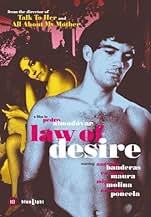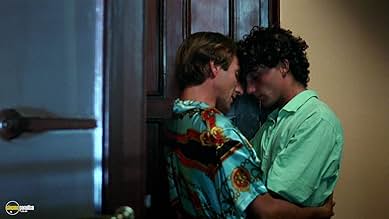NOTE IMDb
7,1/10
15 k
MA NOTE
Un réalisateur homosexuel se lie avec une fan obsessionnelle tout en se languissant de son grand amour absent. Parallèlement, il partage une relation étroite mais complexe avec sa sœur trans... Tout lireUn réalisateur homosexuel se lie avec une fan obsessionnelle tout en se languissant de son grand amour absent. Parallèlement, il partage une relation étroite mais complexe avec sa sœur transgenre, une actrice.Un réalisateur homosexuel se lie avec une fan obsessionnelle tout en se languissant de son grand amour absent. Parallèlement, il partage une relation étroite mais complexe avec sa sœur transgenre, une actrice.
- Réalisation
- Scénario
- Casting principal
- Récompenses
- 10 victoires et 3 nominations au total
Fernando Guillén
- Inspector de policía
- (as Fernando Guillen)
Nacho Martínez
- Doctor Martín
- (as Nacho Martinez)
Bibiana Fernández
- Ada - madre
- (as Bibi Andersen)
Rossy de Palma
- Locutora tele.
- (as Rosy Von Donna)
Avis à la une
One of director Almodovars early films--and one of his best. A gay writer is basically stalked by a psychopath. The films manages to weave together comedy, drama and tragedy and make them all work! Also it manages to work in fairly explicit gay sex scenes and male nudity without it being exploitative--it just fits the storyline and characters. The movie takes a serious misstep about halfway through, throwing in a murder, but manages to regain its footing. The acting is pretty good--not great. Antonio Banderas is so-so as the psycho. I give him credit for engaging in gay sex scenes with no hesitation (I'd love to know what he thinks about this movie now!). The best thing about the movie is the direction--even when the story bogs down in spots, there's always something to look at on screen. Almodovar knows how to make films look beautiful and he, somehow, manages to have the settings fit the tone of the scene. How many directors can you say that about. An excellent film--well worth seeing. But if you're offended by explicit gay subject matter, stay away.
You will find all the familiar Almodovar devices here: telephones, drug use (cocaine in particular), dysfunctional families, sexual ambiguity, pedophile priests, and hospitals. These themes permeate his work, but they are woven intricately throughout this film.
Pablo (Eusebio Poncela) is a writer/director of fantastic movies. He gets into the snares of an obsessive (Antonio Banderas in a great performance) who has a fatal attraction and will kill for his love. At the same time, he has to deal with his transvestite sister played by Carmen Maura (Volver, Women on the Verge, Matador) in another magnificent role.
It is a melodrama about love as that is the overriding need for Banderas and for Maura, who has given up on men since her father left her. It is also about family. Of course, there is a crossing of genres as there is some comedy, but that is minor.
Another magnificent Almodovar film.
Pablo (Eusebio Poncela) is a writer/director of fantastic movies. He gets into the snares of an obsessive (Antonio Banderas in a great performance) who has a fatal attraction and will kill for his love. At the same time, he has to deal with his transvestite sister played by Carmen Maura (Volver, Women on the Verge, Matador) in another magnificent role.
It is a melodrama about love as that is the overriding need for Banderas and for Maura, who has given up on men since her father left her. It is also about family. Of course, there is a crossing of genres as there is some comedy, but that is minor.
Another magnificent Almodovar film.
The most significant aspect of The Law of Desire is the fact that it was so accepted in Spain at the time of its release. It was put forward by the authorities as the movie to represent the country in 1987. Bearing in mind that Spain had only come out of a fascist dictatorship not much more than a decade earlier, this simple fact is a testament to how far the country had moved on in such a short period of time. The reason for this is that this is an unashamedly gay themed film, one that celebrates homosexuality and depicts it without issue.
The film itself is about a love triangle between three men. Like several other Pedro Almodóvar films it's a melodrama with thriller elements. It features an extremely daring performance by Antonio Banderas in a role where he is required to perform in some full-on gay love scenes. These moments made the film front page news in Spain but it did nothing to stop Banderas subsequent rise to stardom. For me, however, this is a middling movie. It's not amongst the director's best. In my view, its interest lies more in its historical significance as opposed to it's worth as a film.
The film itself is about a love triangle between three men. Like several other Pedro Almodóvar films it's a melodrama with thriller elements. It features an extremely daring performance by Antonio Banderas in a role where he is required to perform in some full-on gay love scenes. These moments made the film front page news in Spain but it did nothing to stop Banderas subsequent rise to stardom. For me, however, this is a middling movie. It's not amongst the director's best. In my view, its interest lies more in its historical significance as opposed to it's worth as a film.
This is my second favourite Almodovar film, after "Hable con Ella". It reveals the depth of the characters' feelings with such subtlety and delicacy that as viewers we find ourselves unable to judge the characters' actions. We are puzzled by the intensity of their desire, love and misery in the same way that we are puzzled by Benigno's deep loneliness and longing for love in "Hable con Ella". In "La ley del Deseo," murder and suicide become extreme natural consequences of the characters' love and suffering. We cannot condemn the murder any more than we can condemn the rape in "Hable con Ella".
10gonz30
THE LAW OF DESIRE opened the 1987 Miami Int'l Film Festival. Almodovar and Carmen Maura had already broken through to the American market at this event with WHAT HAVE I DONE TO... a few years earlier. So it was surprising to find them pacing nervously up and down the lobby of the C.Grove Playhouse at THE LAW's North American premiere. They were also in and out of its rest rooms, as the sold out audience roared in laughter and applauded the film, and I was making an early dash to the post-premiere party at the Viscaya Palace. They were acting just like the neurotic characters they bring to life in this and their other films. They were still insecure and frustrated that their huge popularity and celebrity status in Europe was reduced to a recent, almost cult, following in the U.S. They needn't have worried. The film confirmed both of these artists along with Antonio Banderas as stars among North American art movie lovers. (This achievement would be crowned the following year with the triumph of their next collaboration: the Oscar-nominated WOMEN ON THE VERGE...) But THE LAW OF DESIRE will be remembered as Almodovar's self-confessed most personal work, and the masterpiece of his earlier career. This film is pure Almodovar, before he toned down to more mainstream fare. LAW... resumes the Almodovarian style, in all its excesses. It features most of his muses, beyond Maura and Banderas: Rossy dePalma, Bibi Anderssen, Eusebio Poncela, and the rest. His style as a writer/director of women goes over the top here, as does his predilection with telephones, the police, drug use (cocaine in particular), the media, dysfunctional families, sexual ambiguity, the Catholic Church, and the city of Madrid. Almodovar fans will note that all the above themes permeate his work. But nowhere are they so well linked and exposed as in this landmark film.
Le saviez-vous
- AnecdotesThe iconic hose scene was shot twice. The first one wasn't useful because the pressure was so big that Carmen Maura fell down. While the crew adjusted the hose, Maura dried herself and changed the dress. The second time the scene was shot perfectly.
- Citations
Pablo Quintero: It's not your fault if you don't love me and its not my fault if I love you.
- Crédits fousPedro Almodóvar appears in a scene as an employee in a DIY shop and serves Banderas's character.
- ConnexionsFeatured in T'as de beaux yeux, chéri (2007)
- Bandes originalesSymphony No. 10 in E minor, Op. 93
Composed by Dmitri Shostakovich (as D. Shostakovich)
Performed by Orquesta Sinfonica de la Flarmonicade Mosou
Conducted by Kirill Kondrashin (as Kirill Kondrachine)
Meilleurs choix
Connectez-vous pour évaluer et suivre la liste de favoris afin de recevoir des recommandations personnalisées
- How long is Law of Desire?Alimenté par Alexa
Détails
Box-office
- Montant brut aux États-Unis et au Canada
- 72 442 $US
- Week-end de sortie aux États-Unis et au Canada
- 13 399 $US
- 13 août 2006
- Montant brut mondial
- 100 566 $US
- Durée1 heure 42 minutes
- Mixage
- Rapport de forme
- 1.66 : 1
Contribuer à cette page
Suggérer une modification ou ajouter du contenu manquant

Lacune principale
By what name was La Loi du désir (1987) officially released in India in English?
Répondre


































